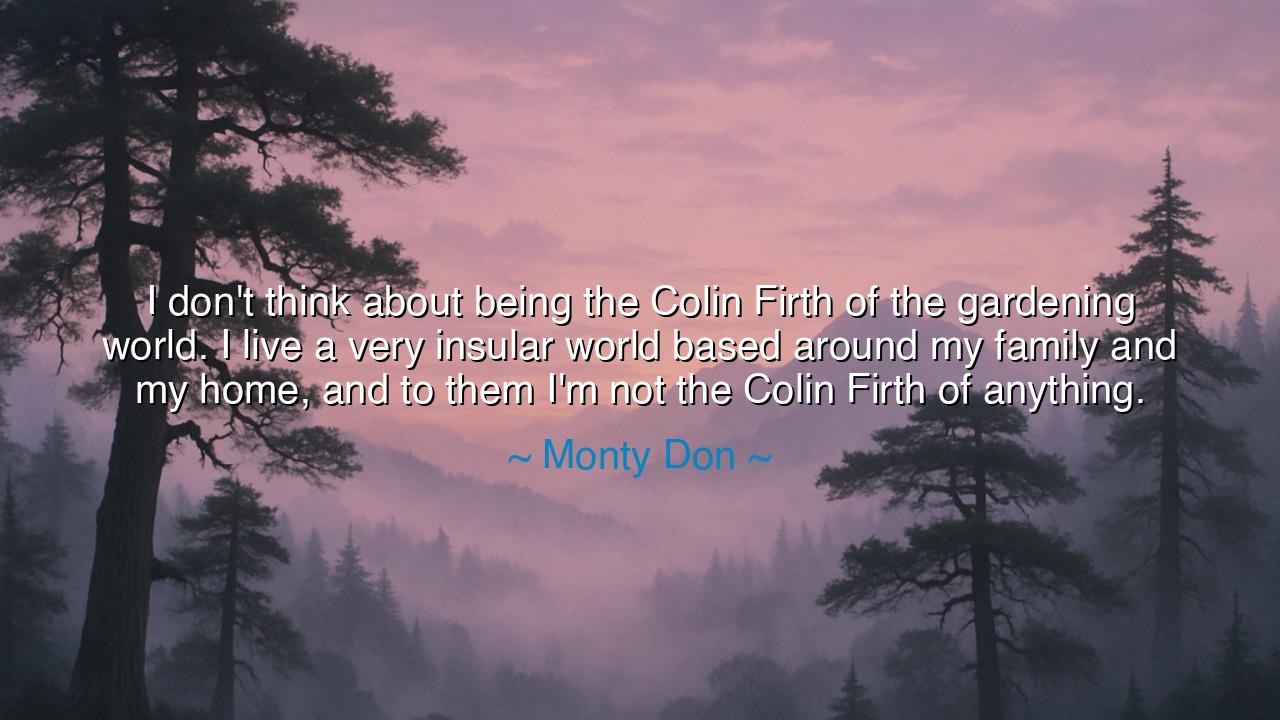
I don't think about being the Colin Firth of the gardening world.
I don't think about being the Colin Firth of the gardening world. I live a very insular world based around my family and my home, and to them I'm not the Colin Firth of anything.






In the quiet spaces of life, far from the hustle of fame and acclaim, there lies a truth—a truth about identity, humility, and the importance of family and personal connection. Monty Don speaks to this truth when he says, "I don't think about being the Colin Firth of the gardening world. I live a very insular world based around my family and my home, and to them I'm not the Colin Firth of anything." These words are more than a simple reflection on fame; they are a reminder of the importance of roots—the foundation of identity that is shaped not by the accolades of the world, but by the love and connection of those closest to us. Monty Don, in his wisdom, shows us that true greatness is not defined by external titles, but by the intimacy and authenticity of the life we create for ourselves and those we hold dear.
The ancients understood well the significance of personal humility and the grounding force of family. In the time of the Greeks, philosophers like Socrates taught that true wisdom was not found in the pursuit of fame or glory, but in the pursuit of virtue and self-awareness. Socrates himself, despite his intellectual achievements, was not concerned with public recognition but with the growth of the soul. His life was one of simple habits, devoted to his work, his friends, and his community. In this light, Monty Don's words reflect an ancient philosophy: true fulfillment lies not in the accolades of the world, but in the peace we find in our homes and within the circle of family.
The life of Marcus Aurelius, the Roman emperor and philosopher, offers another example of this humble wisdom. Despite his power and fame as ruler of the Roman Empire, Aurelius spoke often of the importance of focusing on the internal life rather than external praise. His Meditations are filled with reflections on the virtue of personal integrity, the ephemeral nature of fame, and the need to live in accordance with the natural order. To him, the true measure of a life was not in how the world viewed him, but in how he upheld his values, cared for his family, and contributed to the well-being of others. Similarly, Monty Don reminds us that even in the world of gardening, where one might be tempted to seek recognition, true worth is found not in the pursuit of being someone else’s idol, but in the quiet, steadfast work of cultivating our lives with humility and care.
There is also a practical wisdom in Don’s words that echoes the ancient Roman and Greek understanding of balance. In the ancient world, the ideal of balance was highly revered. The Romans practiced the concept of virtus, a virtue that embodied courage, character, and moral excellence, not in grand gestures, but in daily life. It was believed that the truly virtuous person found peace in their private life, tending to family, home, and community with care and discipline. In this, they saw family as the core foundation of life. Don’s perspective, that he is not the Colin Firth of gardening in the eyes of his family, aligns with this ancient wisdom. The roles we play in our closest circles are often the most significant—where love, duty, and sacrifice create a meaningful existence.
Consider also the example of Confucius, the great Chinese philosopher who taught that the foundation of society rests upon the relationships within the family. In Confucian thought, a person’s worth is defined not by their status or fame, but by their integrity in fulfilling their roles within the family—whether as a child, parent, or sibling. Confucius spoke of the importance of respect, filial piety, and the quiet, everyday acts that strengthen the fabric of society. In his teachings, the smallest gestures of kindness and the humblest duties held the greatest value, for they were the threads that bound a person to their moral and spiritual responsibilities.
Don's rejection of the desire for fame within his personal life speaks to a profound understanding of truth. He recognizes that while the world may applaud the image of a celebrity or public figure, true fulfillment lies in the authenticity of one's personal connections. The family and home are the sanctuaries where we find our true selves, where we are not judged by external measures of success but are accepted for who we truly are. This wisdom, passed down through the generations, calls us to reaffirm the importance of family and community in shaping our identity and finding peace in the simplicity of our private lives.
The lesson to take from Don’s words is one of balance and grounding. In a world that often elevates fame, success, and external validation, we must remember that true greatness is not measured by the applause of others, but by the love, integrity, and care we show in the intimate spaces of our lives. As the ancients have taught us, our worth is not found in being seen as something we are not, but in living with authenticity, fulfilling our responsibilities with love, and nurturing those who are closest to us. In this, we find the greatest reward—a life well-lived, grounded in the values of family, humility, and connection. So, like Monty Don, let us cherish the private world we create, knowing that it is there, in the quiet spaces, that we cultivate the truest form of wisdom and fulfillment.






AAdministratorAdministrator
Welcome, honored guests. Please leave a comment, we will respond soon